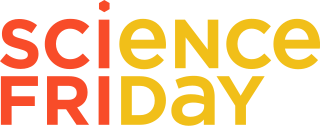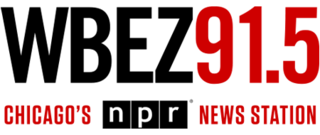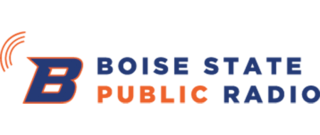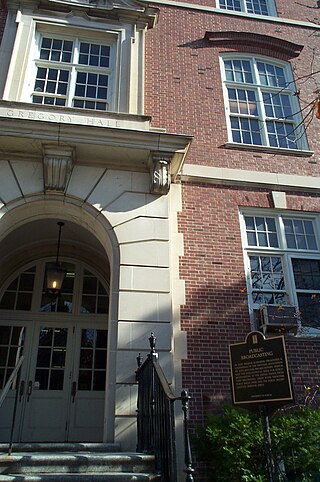Minnesota Public Radio (MPR) is a public radio network for the state of Minnesota. With its three services, News & Information, YourClassical MPR and The Current, MPR operates a 46-station regional radio network in the upper Midwest.

Science Friday is a weekly call-in talk show that broadcasts each Friday on public radio stations, distributed by WNYC Studios, and carried on over 470 public radio stations. SciFri is hosted by science journalist Ira Flatow and was created and is produced by the Science Friday Initiative. The program is divided into two one-hour programs, with each hour ending with a complete sign-off. The focus of each program is news and information on science, nature, medicine, and technology. The show originated as the Friday episode of the daily call-in talk show Talk of the Nation, but was spun off as a series in its own right when Talk of the Nation was canceled in June 2013.
The Alfred I. duPont–Columbia University Award honors excellence in broadcast and digital journalism in the public service and is considered one of the most prestigious awards in journalism. The awards were established in 1942 and administered until 1967 by Washington and Lee University's O. W. Riegel, Curator and Head of the Department of Journalism and Communications. Since 1968 they have been administered by the Columbia University Graduate School of Journalism in New York City, and are considered by some to be the broadcast equivalent of the Pulitzer Prize, another program administered by Columbia University.

WBEZ – branded WBEZ 91.5 – is a non-commercial educational radio station licensed to Chicago, Illinois, and primarily serving the tri-state region of the Chicago metropolitan area. It is owned by Chicago Public Media and is financed by listener contributions, corporate underwriting and some government funding. WBEZ is affiliated with both National Public Radio (NPR) and the Public Radio Exchange (PRX). It also broadcasts content from American Public Media and the BBC World Service. It produces several nationally syndicated shows for public radio stations, including documentary program This American Life, and co-produces news and politics quiz program, Wait Wait... Don't Tell Me! with NPR.
American Public Media (APM) is an American company that produces and distributes public radio programs in the United States, the second largest company of its type after NPR. Its non-profit parent, American Public Media Group, also owns and operates radio stations in Minnesota and California. Its station brands include Minnesota Public Radio and Southern California Public Radio. Based in St. Paul, Minnesota, APM is best known for distribution of the national financial news program Marketplace.

Marketplace is an American radio program that focuses on business, the economy, and events that influence them. The program was first broadcast on January 2, 1989. Hosted by Kai Ryssdal since 2005, the show is produced and distributed by American Public Media. Marketplace is produced in Los Angeles with bureaus in New York, Washington, D.C., Portland, Baltimore, London, and Shanghai. It won a Peabody Award in 2000.
William Hugh Kling is the founder and president emeritus of Minnesota Public Radio and American Public Media. He was also a founding member of the board of directors of National Public Radio, the founding chairman/president of Southern California Public Radio in Los Angeles, and the founding chairman and president of Public Radio International. Kling is a social media entrepreneur who built both nonprofit public media companies and for-profit companies to support those nonprofits.

The World is a public radio international news magazine co-produced by the WGBH Educational Foundation and the Public Radio Exchange (PRX) and co-hosted by Marco Werman and Carolyn Beeler. The show is produced from the Nan and Bill Harris Studios at the WGBH building in Boston, Massachusetts.

On the Media (OTM) is a public radio show and podcast from WNYC Studios that primarily covers the media. Since relaunching in 2001 with Brooke Gladstone as host, the show has received at least ten awards, including two Peabody Awards.
Studio 360 was an American weekly public radio program about the arts and culture hosted by novelist Kurt Andersen and produced by Public Radio Exchange (PRX) and Slate in New York City. The program's stated goal was to "Get inside the creative mind" and used arts and culture as a lens to understand the world. The program was created by PRI based on an identified need for programming dedicated and focused on arts and culture journalism in media. While the show featured regular guest interviews with authors such as Joyce Carol Oates, Jonathan Lethem, and Miranda July, and musicians as diverse as Laura Veirs, Don Byron, and k.d. lang, it also had several recurring segments. The American Icons series attempted to understand lasting American cultural icons such as The Great Gatsby and Kind of Blue. The hour on Moby-Dick was the recipient of the 2004 Peabody Award. Public Radio International and WNYC co-produced the show from 2000 to 2017, when Slate replaced WNYC. After PRI merged with PRX, PRX continued to syndicate the show until the program's cancellation. The program was funded in part by the National Endowment for the Humanities
Performance Today is a Peabody Award-winning classical music radio program, first aired in 1987 and hosted since 2000 by Fred Child. It is the most listened-to daily classical music radio program in the United States, with 1.2 million listeners on 237 stations. It builds its two-hour daily broadcast from live concert performances from around the world. It airs from the American Public Media (APM) studios in Saint Paul, Minnesota, and frequently simulcasts special programs from festivals and public radio stations around the country.

The WGBH Educational Foundation, doing business as GBH since August 2020, is an American public broadcasting group based in Boston, Massachusetts. Established in 1951, it holds the licenses to all of the PBS member stations in Massachusetts, and operates its flagship station WGBH-TV, sister station WGBX-TV, and a group of NPR member stations in the state. It also owns WGBY-TV in Springfield, which is operated by New England Public Media under a program service agreement.
The Public Radio Exchange (PRX) is a non-profit web-based platform for digital distribution, review, and licensing of radio programs. The organization is the largest on-demand catalogue of public radio programs available for broadcast and internet use.

WGBH is a public radio station located in Boston, Massachusetts. WGBH is a member station of National Public Radio (NPR) and affiliate of Public Radio Exchange (PRX) and American Public Media (APM). The license-holder is WGBH Educational Foundation, which also owns company flagship WGBH-TV and WGBX-TV, along with WGBY-TV in Springfield.
WVRU-FM is a non-commercial public radio station in Radford, Virginia. It is owned and operated by Radford University. The station plays jazz music, adult album alternative and world music. It airs National Public Radio (NPR) and Public Radio Exchange (PRX) news and talk shows afternoons and weekends, and runs the BBC World Service overnight.

The Takeaway was a weekday radio news program co-created and co-produced by Public Radio International and WNYC. Its editorial partner was GBH; at launch the BBC World Service and The New York Times were also editorial partners. In addition to co-producing the program, PRX also distributed the program nationwide to its affiliated stations. The program debuted on WNYC in New York, WGBH in Boston, and WEAA in Baltimore. At time of its last broadcast, the program had approximately 241 carrying stations across the country, including markets in New York, Los Angeles, Chicago, San Francisco, Miami, Portland, Boston, and more.
The Public Radio Satellite System (PRSS) is the interconnected satellite-distributed network managed by NPR, and used by NPR, Public Radio Exchange (PRX), and American Public Media (APM), as well as independent public radio program producers, to distribute programming via satellite to public radio stations across the United States.

National Public Radio is an American public broadcasting organization headquartered in Washington, D.C., with its NPR West headquarters in Culver City, California. It serves as a national syndicator to a network of more than 1,000 public radio stations in the United States. It differs from other non-profit membership media organizations, such as the Associated Press, in that it was established by an act of Congress.

Boise State Public Radio is a broadcast service of Boise State University, which operates four programming services on several radio stations throughout central and southern Idaho and northern Nevada.

In the United States, other than a few direct services, public broadcasting is almost entirely decentralized and is not operated by the government, but does receive some government support.











